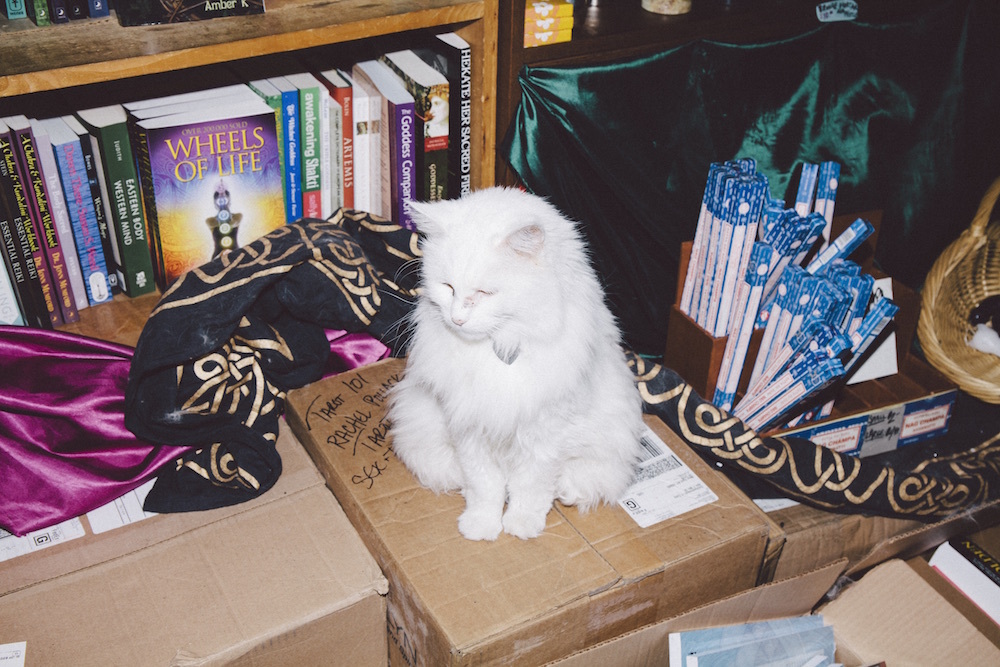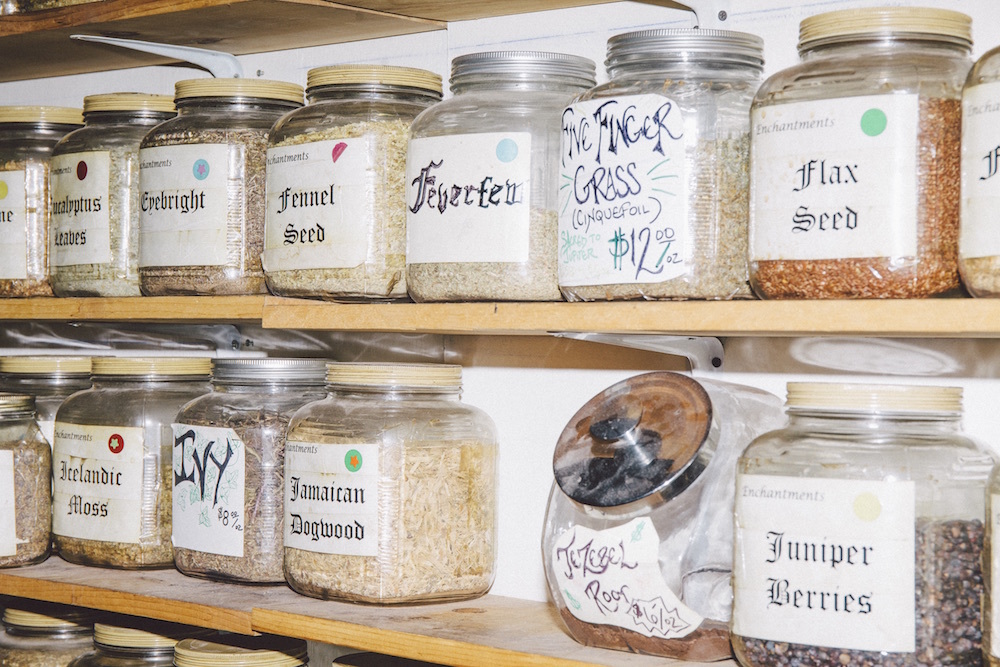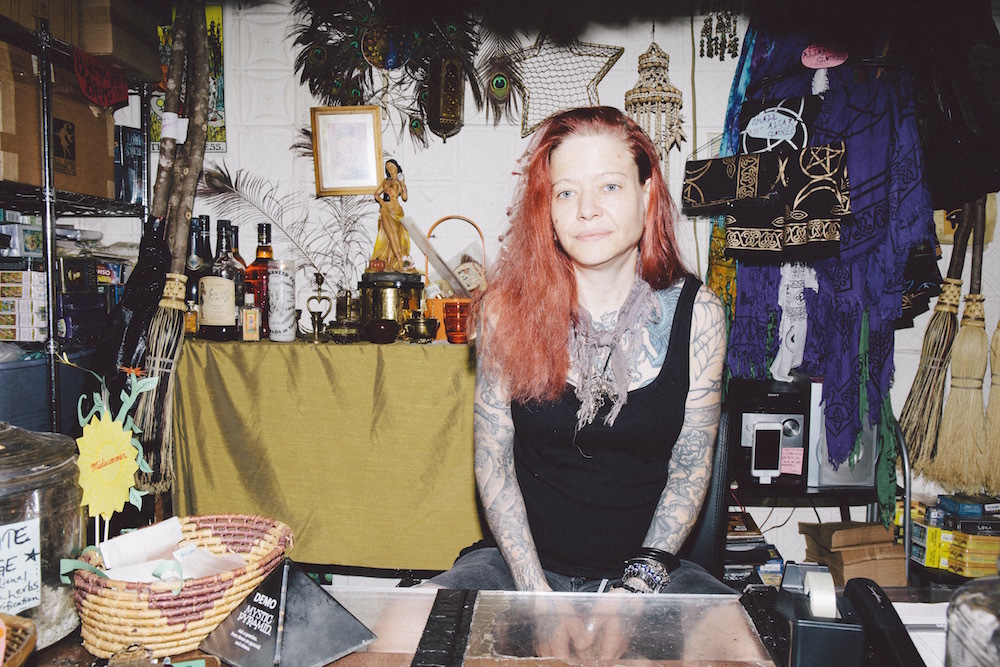“Magic is not about putting hexes on people,” 33-year-old witch Stacy Rapp told me ten minutes into our conversation. I hadn’t even asked her about black magic yet. But she (rightly) anticipated being asked one of “the same stupid questions” she’s been asked for over a decade.
When people walk into Enchantments, a basement-level trove of magical paraphernalia on East 9th Street, they’re inevitably looking to find what humans always want to find: love and money. But, every now and then, Stacy also gets what she refers to ominously as “the other requests.” Black magic, though, is categorically not what the pink-haired witch is about.
Stacy took over the store in 2003 from its original owner – after a rift she’d rather not talk about – and decided to change its direction. “I had the sense that it could become something really strong and positive,” she says. “I wanted to shift the focus a little bit, to move it away from the traditional love and money stuff and towards the ability of magic to help people improve themselves.”
It turns out that today, in Manhattan, witchcraft is more about self-empowerment than being able to seduce the captain of the football team or battling unnamable sorcerers with your squad. And clearly that is something that appeals to real people in real life. During our time in the store, a group of teenage girls examined a case full of tarot cards. A man wearing pastel shorts and boat shoes looked intently at the jars of herbs and dried plants. A student in Birkenstocks waited as her custom spell candle (the store’s specialty) was handcarved. And various customers perused the extensive selection of books on Wicca, astrology, herbalism and auras. At one point, three kids waved a six-inch fertility candle around before being asked to leave.
Later, sitting in the garden by the ceremonial fire pit (only recently extinguished after the summer solstice ritual), we talked about what it means to practice witchcraft in 2015.

Apart from selling supplies, how do you and your staff help people?
The biggest thing that we do is making custom spell candles. Candle magic is some of the easiest magic because it’s physical. Magic is basically about intention. It’s about focusing your energy on something, and burning a candle is something obvious that you can focus on. But we also sell a lot of books for people who are interested in magic and psychic development, and we teach classes on candle magic, orb magic, tarot, everything.
Does everything you do fall within the same magical tradition? Is the store Wiccan?
Most countries have pagan traditions. Wicca is one, sure, and it’s the best known. But most of what we do is more universal. Not because there is anything wrong with Wicca. It’s because at this point you are dealing with people on the internet and urban culture. Wicca is based on where it came from (the forests of England) and it’s very European, most of the deities are Greek and Roman and white. We incorporate African, Asian and Celtic deities, to try to accommodate anybody who walks in.
Do the different traditions work well together?
Yes, in general. We’re in a city and it’s a melting pot of people. So that kind of eclectic energy seems to be the most attainable here. We do hold open Wiccan rituals here though, for the Sabbats. There are eight Wiccan Sabbats every year. Four of them correspond to the equinoxes and the solstices and four are the midpoints between those. Wicca is very old English, it comes from a very agricultural society. And the big appeal for it now is that unlike a lot of other traditional religions, Wicca is a balance. You have a really strong female deity and a male deity. Yes there are men who come in, but we do have a slightly higher percentage of female customers. I think a lot of people are like, “Wait, why [are the deities] all men? I need female empowerment, and women that I can actually look up to and respect.”
Why historically, has witchcraft been associated with women?
That goes way back. [In the West], witchcraft originated from herbal healing medicine. In other cultures, there were male shaman and medicine men. But here accusations of witchcraft – and the best example is the witchcraft trials in Salem – were a way to subjugate and punish strong, outspoken women with knowledge. There was also this idea that anything that wasn’t understood was the work of the devil. The reasoning went that the only person who could heal disease was a priest, with the help of God. But a woman couldn’t be a priest so she had to be getting help from somewhere else. There’s a great book called When God Was a Woman that traces all of this. I think pre-Christianity a lot of this was not the case. And a lot of other cultures don’t have these biases.
What are some of the most active magical groups in New York?
Most of them are closed off. So the most active group at this point would probably be us, because we are the ones who are educating people and letting them come to rituals. But there are Wiccan covens, Norse covens and Ceremonial Magic groups. Ceremonial Magic also originated in England, but it was more aristocratic than Wicca. It was John Dee, Queen Elizabeth I’s astrologer Aleister Crowley, and the OTO. It’s more of an intellectual magical pursuit – a lot of it is in Latin and Greek. Then there’s Santeria, which tends to be more popular in New York than some of the Wiccan stuff, partly because here’s a huge Spanish-speaking population here. If you go on Witchvox, you can type in your location and it will give you open groups in your area.

What do you usually recommend to someone coming into the store for the first time?
We always start with books. Usually, Psychic Self-Defense by Dion Fortune, which is essentially about how to work with energy. It teaches you how to clear your space of negativity and how to block out other people’s energies. Since we’re in New York City and we deal with people and their energy on a regular basis, it’s the best place to start. But we have intro books to most things, it really depends what a person is interested in.
What requests do you say no to?
We don’t do curses.
Where do you draw the line between magic and “black magic”?
Black magic is magic that is intended to do harm to someone who has not done any harm to you. The most obvious example is: “I want to break up this couple because I want to date one of the people.” It’s straight-up black magic because you are trying to break up a relationship because you want something! And obviously, if someone wants to kill someone who’s never even touched them, I’m like, “Get the fuck out of my store and don’t come back.”
Has anyone ever actually asked you to do that?
Yes, unfortunately. There are places in this business that will sell someone the ingredients to do that. But we’ve lasted thirty years, and it’s partly because we refuse to do anything negative. We have a moral code that not everyone does.
Credits
Text Alice Newell-Hanson
Photography Katie Mccurdy
